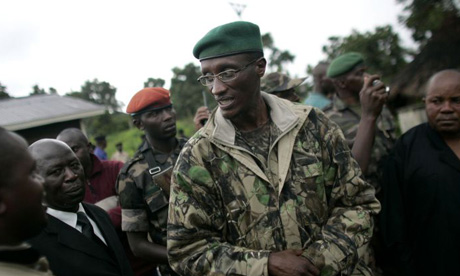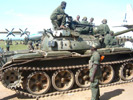Here's a portrait of a War Criminal:
"BUNAGANA,
Congo — At the entrance to this bustling border town is a most unusual sight: a speed limit sign. In fresh red, white and blue paint, it is a rare manifestation of order in a nation better known for chaos.
Skip to next paragraph 
Benedicte Kurzen/VII Mentor
Mr. Nkunda at a training camp in North Kivu Province for the group of rebels that he leads.

Benedicte Kurzen/VII Mentor
Gen. Laurent Nkunda, the leader of a group of rebels, with his pet goat Betty in the mountains of Congo. His aims include the removal of President Joseph Kabila, whose power has been waning.

Benedicte Kurzen/VII Mentor
Gen. Laurent Nkunda after a meeting with the news media in November in the town of Kichanga in Congo.
The seemingly innocuous signpost is emblematic of the growing might and wider ambitions of Laurent Nkunda, the renegade Congolese general and warlord who now holds part of Congo’s future in his grip.
“I am fighting for the destiny of this country,” said Mr. Nkunda, offering up the orderly streets and neatly terraced farms of the surrounding countryside as evidence of what Congo might be like if he ran things. “What we want is to restore the dignity of this country and these people.”
But beneath the veneer lies a ruthlessness of a piece with Congo’s unbroken history of brutality. With a military campaign in October and November that was met with a feeble response( THIS IS A DISGRACE ) from both the Congolese government and United Nations peacekeeping forces here in eastern Congo, General Nkunda has pushed the nation to its most dangerous precipice in years.
Many here fear a new regional war or that an alliance of convenience between General Nkunda and other enemies of the president could lead to the ouster of Congo’s first democratically elected government in four decades.
That General Nkunda, who is suspected of committing a litany human rights violations, could be a leading figure in such a move is a chilling thought for many Congolese. A recent journey through territory he controls revealed a host of contradictions between the image he puts forward and reality, including evidence of mass killings, the extraction of onerous payments from residents, illegal profiteering from the mineral trade and the conscription of child soldiers.
General Nkunda’s campaign began as a local insurgency aimed at redressing the grievances of a Tutsi minority that felt threatened by the aftershocks of the Rwandan genocide. But it has grown into a rebellion with a broad set of aims that include the removal of President Joseph Kabila, who was elected in 2006 after more than 40 years( 40 YEARS ) of tyranny and war in this country. “We have national ambitions,” General Nkunda declared, a hint of triumph in his voice. “We are talking about Congo.”
Some of this talk may be grandiose bluster from a man fond of referring to himself in the third person( WHO'D WANT TO BE HIM ) and who prefers to be photographed holding a scepter capped by a silver-plated eagle’s head. General Nkunda is despised by many in eastern Congo for his brutal tactics. He is also widely perceived as a proxy for Rwanda, a country whose meddling is largely detested by Congolese citizens. The general claims that he does not want to replace Mr. Kabila, merely to sit down and have direct talks.
But his forceful new challenge poses grave risks for Mr. Kabila, who is weaker than ever. The national army was routed on the battlefield, retreating virtually without a fight, pillaging and raping as it went.
The country’s economy, once fast-growing, is in shambles as the prices of minerals have plummeted in the global recession, and Mr. Kabila is increasingly unpopular. In eastern Congo, many people are unhappy at his failure to halt General Nkunda’s relentless military advance. In the west, where he has never been popular, he is under threat from political opponents who see his government as intolerant of dissent.
One by one, those who oppose him have felt the violent wrath of his security forces, according to human rights investigators and political analysts. A Human Rights Watch investigation found that 500 people had died and 1,000 had been detained in these crackdowns.
In the face of Mr. Kabila’s plummeting stature, General Nkunda has cultivated an image as a disciplined crusader bent on bringing order to the country. He dresses in sharp uniforms or flowing, immaculate white robes. He has claimed to be an evangelical minister and at times wears a pin that reads, “Rebels for Christ.” General Nkunda and his top commanders say their fighters have a commitment to discipline as well: drunkenness, looting and rape are offenses punishable by imprisonment and possibly death, according to senior rebel officers.
But in 2002, when General Nkunda was a commander in a different rebel group, he participated in the mass killing of 160 mutineers in the city of Kisangani, human rights groups say. According to Human Rights Watch, “Forces under Nkunda’s command bound, gagged, and executed twenty-eight persons and then put their bodies in bags weighted with stones and threw them off a Kisangani bridge.”
Two years later, his men took the city of Bukavu, and days of killing and rape followed, investigators say. Since 2005, when he formed his own rebel group, known as the National Congress for the Defense of the People, or C.N.D.P., his forces have carried out a number of massacres, according to human rights investigators, most recently at Kiwanja, in early November, where 150 people were executed.
In Nkunda territory, the general says, civilians are never harmed and live without fear of violence or looting. His men offer up the endless, Eden-like valleys around this town as proof. Terraced into rows as tidy as seats in an amphitheater, the land bespeaks a kind of ordered plenty.
But farmers here say they are forced to hand over a precious portion of their harvest to feed the fighters: 45 pounds of beans or grain, and as much as $20 a season in taxes, an enormous sum in a place where most people live on far less than a dollar a day.
General Nkunda said his rebellion was not motivated, like so many others fighting here, by plunder of Congo’s natural resources.
“I am not here for minerals,” he said. Indeed, there are almost no mines in the areas under his control, and General Nkunda has avoided getting directly involved in mining, fearing the taint of blood minerals that has stained virtually every group fighting here, including Congo’s own army.
But his fighters collect taxes on virtually every commercial vehicle and bushel of crops that come out of territory they control, according to residents and a United Nations report released last week. They even take a cut of the $300 permits sold to tourists wishing to see Congo’s rare mountain gorillas.
“The money goes to the rebels,” said one of the park rangers who monitors the animals. “None of it comes to us( UNREAL ).”
General Nkunda’s men also profit from Congo’s minerals. Thousands of tons of tin ore, coltan and other minerals pass through the border crossing here to Uganda, headed to Kenya’s Indian Ocean port, and the rebels take a slice of the duties and taxes collected here, United Nations officials say. General Nkunda denied this, saying his men sent all taxes to the government.
According to rebel officials, in Nkunda territory children are never made to wield Kalashnikov rifles and kill. But boys like Eric, who is now 16 but says he has been fighting with armed groups since he was kidnapped by Hutu militiamen at the age of 9, say General Nkunda’s rebellion forces hundreds of children to fight.
“The strategy they use is this,” he explained. “When they met children on the road, they ask them to help them carry their goods.”
The boys are then taken to training camps, given guns and taught to fight, Eric said. His eyes are wide in permanent surprise, and he said he had headaches that did not respond to medicine. Loud noises terrify him.
“Too many bombs,” he explained in a soft voice.
For two years, from 13 to 15, he said he fought with General Nkunda’s troops.
“Many of us were boys,” he said. “They would send us out first, then the men.”
He lives in a shelter for boys separated from their parents by the war. In the next bunk is his friend Fabrice, a 14-year-old former Mai Mai fighter who used to do battle with General Nkunda’s forces.
“I always felt bad to kill other children, because I knew they had been forced to fight just like me,” he said.
General Nkunda seems to have little trouble drawing new recruits, because each man is issued a uniform, a gun and training, unlike Congolese soldiers, who can go months without salaries. Some fighters are drawn to the rebels for ethnic reasons, but many others simply want to fight on the side that wins. His force is more disciplined, General Nkunda says, because they are fighting for a cause they believe in.
General Nkunda seems determined to play the role of statesman in waiting, receiving visiting diplomats and emissaries like a chief of state. He rejects the legitimacy of the Kabila government, so the United Nations appointed the former president of Nigeria, Olusegun Obasanjo, to cajole General Nkunda back to the negotiating table.
“What is democracy?” he mused, worrying his scepter, which has grown brassy over the years as his rebellion has flourished. “Democracy is not elections ( HERE WE GO ). Democracy is legitimacy. And legitimacy comes from what you are doing to your people( TERRORIZING THEM ).”
General Nkunda is all but certain to face an arrest warrant from the International Criminal Court for atrocities committed during his years fighting here, human rights investigators say, most recently in Kiwanja, where his men executed civilians and torched camps that housed 30,000 displaced people.
“Nkunda destroyed my life,” said Anorite Zawadi, 27, whose 8-year-old daughter disappeared when General Nkunda’s troops razed the camp in which her family lived. The girl has not been seen since.
“He has no mercy on us,” she continued. “He brings only death and sorrow.”














































